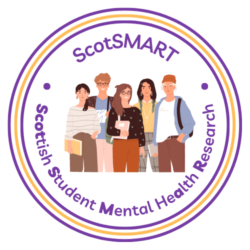This month the Scottish Student Mental Health Research Network’s Public Health Working Group published their article “ Student Mental Health – Why taking a public health approach is necessary” in Education Today.
ScotSMART has invited two members, Annabella Feeny and Fabienne dos Santos Sousa, from this group to reflect on this approach and its potential impact on student mental health in Scotland.
What motivated you to join the ScotSMART Public Health Working Group?
Student mental health is a critical issue that needs to be addressed across Scottish universities. We first connected with ScotSMART after conducting our own research on higher education mental health services in Scotland.
Our research shed light on the alarming rise of mental health difficulties among university students. Many universities seek to respond to this challenge with a focus on mental health intervention, for example through counselling services. While counselling services are invaluable in supporting vulnerable students, many services cannot handle their growing demands. Further, counselling services cannot fully address key societal drivers of student mental health difficulties, such as the cost of living crisis.
We were motivated to join the ScotSMART Public Health Working Group to explore more comprehensive strategies that universities can adopt to improve student mental health, through mental health prevention and enhancement of support services.
What has been your experience working with a multidisciplinary working group?
Working with a multidisciplinary team consisting of practitioners, academics, researchers, and service managers has been an enriching and dynamic experience. One of the most rewarding aspects of this collaboration has been the wealth of knowledge and diverse perspectives brought to our team. Each member of the group offers unique insights and best practices from their respective fields and organizations, which has allowed for a comprehensive understanding of the multifaceted nature of student mental health within higher and further education settings.
What are the benefits of adopting a public health approach to student mental health in university and college settings?
One of the challenges facing universities is the increasing student demand for mental health support. Many institutions cannot meet this demand, which has significantly increased average waiting times for counselling support, with some students waiting over three months for a first counselling session. Integrating a public health approach would shift the focus from providing individual treatments through counselling services to highlighting multiple leverage points across societal, community, relational, and individual levels. A public health approach as a whole university intervention would embed mental health resources, support, and education across the entire student community, rather than targeting specific individuals.
How do you envision the future role of this working group in addressing student mental health?
Our ScotSMART public health working group recently published an article in Education Today, “Student Mental Health – Why taking a public health approach is necessary” which provides best practices for institutions towards integrating a public mental health approach into their student communities. These practices will be explored in depth at the annual Scottish Student Mental Health Research Network event on April 16th, 12-5 pm at the University of Edinburgh Business School.
Our next step in the working group is to conduct a comprehensive mapping exercise to depict who is involved in student mental health across Scotland – and to identify gaps where people, organisations and the government can collaborate to benefit student mental health. Through our multidisciplinary group collaborations, we hope to develop a policy framework to instil lasting positive impacts that extend far beyond students’ academic journey.



